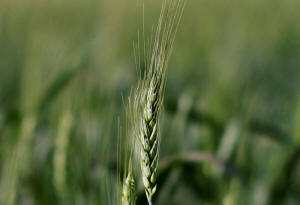Brazil approves GMO wheat as food supply fears help convince skeptics
 Send a link to a friend
Send a link to a friend
 [March 04, 2023]
By Maximilian Heath and Ana Mano [March 04, 2023]
By Maximilian Heath and Ana Mano
BUENOS AIRES/SAO PAULO (Reuters) -Brazil has approved the cultivation
and sale of drought-tolerant genetically modified wheat, a major boost
for the once taboo crop as global food supply fears and regional dry
weather burnishes the lure of GMO.
The approval, which biosecurity agency CTNbio posted, makes Brazil the
second nation after Argentina to approve Bioceres' HB4 wheat strain for
cultivation. Other markets have approved it for consumption.
Brazil is one of the world's largest consumer markets and food
exporters. While the green-light does not mean Brazil will necessarily
grow GMO wheat for production soon, it reflects a major shift in
attitudes as climate change and the war in Ukraine sharpen worries over
a global food crisis.
GMO wheat has never been grown for commercial purposes due to consumer
fears about allergens or toxicities in the staple crop used worldwide
for bread, pasta and pastries. Biotech varieties of corn and soy, used
for animal feed, biofuels and ingredients like cooking oil, are
commonplace.
Bioceres said in a statement on Friday the approval meant "opening the
Brazilian market to the technology," adding it would help ease
commercialization of the strain in Argentina. The two countries dominate
South America's wheat production.

Plant genetics company Tropical Melhoramento e Genetica, a partner in
Brazil of Argentina's Bioceres, made the approval request.
WARM WELCOME
Abimapi, an association representing biscuit, pasta, bread and cake
makers in Brazil, said the approval could potentially increase internal
supplies, which could reduce industry costs.
[to top of second column]
|

A view shows wheat crops to be harvested
this year, in Arapongas, Brazil July 6, 2022. REUTERS/Rodolfo Buhrer

The association was against adopting GMO wheat previously, but
changed its stance after a survey it commissioned showed more than
70% of Brazilians would not mind consuming products containing it.
Brazil has been growing domestic wheat using conventional plants
adapted to local climate conditions, but still relies on supplier
Argentina for sizeable imports.
Brazil plants about 3 million hectares (741,316 acres) with wheat,
mostly in southern states like Rio Grande do Sul and Parana.
Drought-tolerant wheat may appeal to farmers in that region, where
crops such as corn and soy have faced water stress. In Argentina,
drought since last year cut the wheat crop in half.
Bioceres has said its GMO wheat "showed higher yields than
conventional varieties across all environments, with an average 43%
yield improvement in targeted environments."
In November 2021, Brazil became the first country in the world to
allow imports of flour made with GM wheat.
Abitrigo, Brazil's flour millers industry group, also hailed the
decision, saying it solves "the risk of regulatory conflicts"
because approval of flour imports was granted before use of Bioceres'
HB4 wheat was effectively cleared in the country.
"The approval for planting, imports and commercialization of GMO
wheat resolves this issue, bringing peace of mind to different
market actors," Abitrigo said in a statement. "The final word will
rest with consumers."
(Reporting by Maximilian Heath in Buenos Aires and Ana Mano in São
Paulo; Editing by Steven Grattan, Adam Jourdan and Jan Harvey)
[© 2023 Thomson Reuters. All rights
reserved.]This material may not be published,
broadcast, rewritten or redistributed.
Thompson Reuters is solely responsible for this content. |